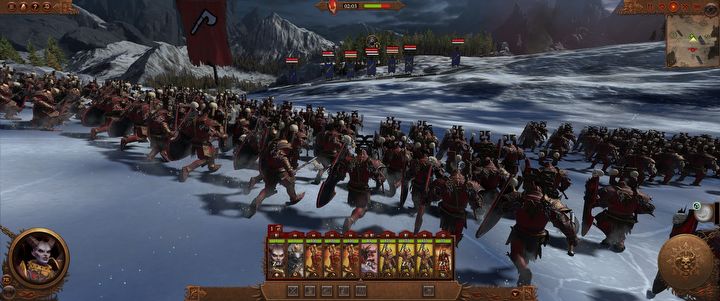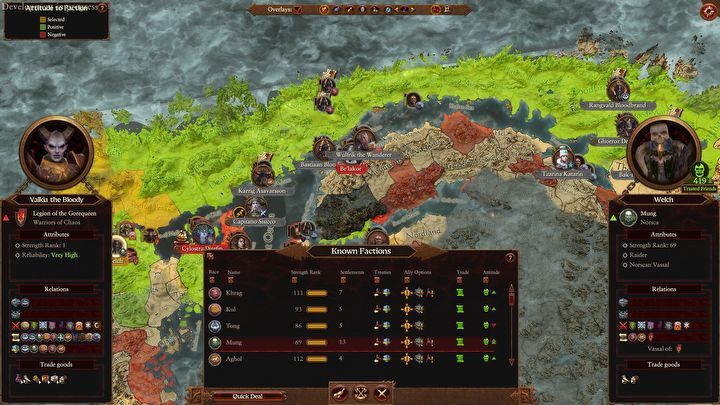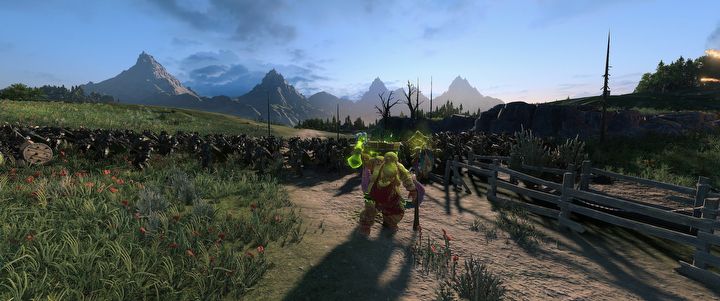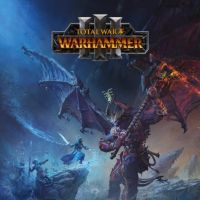Never Have I Ever Been So Afraid of Next Turn As in This Game
Total War: Warhammer 3 has a second – some even say bull-blown – release. The new campaign, Immortal Empires, is an addictive mayhem and sandbox of great unpredictability.
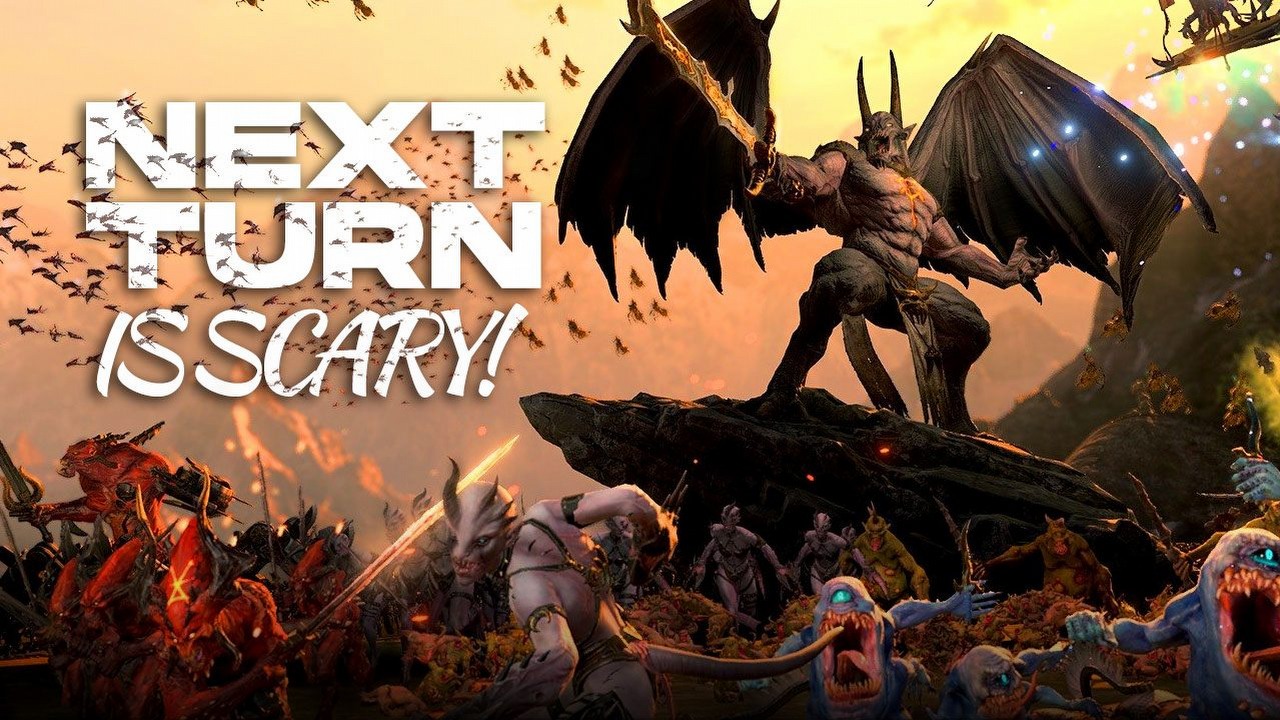
Immortal Empires brings the largest map in the history of the series, combining the three parts of the game into one, massive supermap. And while it sounds like a task for those who have no life, job, school, kids, dogs, cats and no responsibilities, in reality Total War: Warhammer 3 is also a game for people who can only afford a few hours of gaming every now and then.
The collection brought Total War: Warhammer 3 back to life. If you have played the Mortal Empires in Total War: Warhammer 2, you know what the formula is all about. The recipe for success, at least on paper, seems splendidly simple: combine three large maps from each Total War and give players all the factions and lords to play with freely. And while this sounds like a madman's idea, raising at least a few concerns (what about the performance with such a huge map? How to sort out the goals of dozens of factions? How to balance the nations? Will it even make anyone happy?), the result turned out to be more than pleasing – it is an incredibly playable and... intimidating mess. And the player has to find their way around it. This is the first campaign of Warhammer in which I was afraid to click for next turn
There's method in this madness
This breakneck concept of combining already huge games, turned out to be exactly what the series was missing. First of all, this is the most TOTAL installment you can experience in this series. Total War. Second, the chaos on the map is unpredictable, unbridled, unique – but also highly addictive. Third, the 86 factions (specifically, 23 factions from three parts plus DLCs, all with a few different lords to lead – each with a different goal and their own gameplay mechanics) is a choice that will satisfy literally every fan of the world of the Warhammer (although we, the most picky followers of the Dark Gods, still count on the Chaos Dwarves). Fourthly, and surprisingly, such a large map and the multitude of cities and lords didn't cripple my already venerable i5 8600k CPU. Fifth, and finally, new gameplay objectives for each faction are a fantastic idea that will appeal to both casuals and hardcore fans who only play legendary difficulty.
The campaign in Immortal Empires doesn't have story-driven goals. Rather, it's a powerful sandbox in which great empires clash giving rise to new powers in turn-based, grand campaign. However, Creative Assembly's magicians have divided the objectives of each faction into three tiers. The small victory campaign will appeal to those who like fast-paced gameplay and don't want to start a party to finish it after a month. Often – though not always – these are objectives that can be accomplished relatively quickly; for example, the Skaven under Ikit the Claw in the short campaign simply have to destroy three neighboring factions, and conquer or raze 30 cities along the way. In the long campaign, they have to fulfill all the same conditions plus raze or conquer 75 cities, and control – directly or through vassalization and military alliances – 7 key, though relatively closely placed settlements.
There is also the ultimate goal, for the most persistent conquerors (myself included), masters of the game (certainly not me) and people with the blessing of longevity – a campaign of domination, the goals of which will be achieved when we conquer, raze or invade 272 different settlements. And finally, there's the goal of concerning the so-called Final Crisis, but more about that later.
Of course, there are easier and more difficult campaigns. For example, Valkia the Bloody, representative of the god Khorne from the new DLC, Champions of Chaos, released on the occasion of the launch of Immortal Empires, must conquer or vassalize in a short campaign 13 cities... scattered across the entire continent. In addition, some factions are easier, while others are more difficult, not to mention everyone's personal preferences and styles. Everything depends on the faction, starting location, victory conditions, as well as what's happening on the map. And the gods... There really is a lot going on.
The chaos you must learn to control
Filling even such a huge map with a few hundred settlements and cities, the geopolitical situation changes literally with every turn. States fall, and new ones are born from the ashes. Conflicts erupt, big and small wars ensue. In addition to factions and legendary lords – i.e. those you can play – you will find many minor groups on the map that will make your life extra miserable (or easier). So, from the beginning, you must, first of all, understand perfectly which race and which lord you control – in order to be able to make the most of the available mechanics, and secondly, not forget about diplomacy. While it is possible to start a war with everyone, it is rather not recommended. At the end of the day, you will be fighting on all fronts anyway. However, it's better to do it later than sooner.
Immortal Empires seems the most fun when our starting location seems relatively safe. A mountain chain, a strait or simply an ally that blocks the expansion of a legendary lord – these are the things you need now more than ever. Successes, however, have their consequences – each expansion raises the risk of another war, and therefore another faction that sends troops to our lands – lands that are getting bigger and bigger, and therefore more difficult to defend. Never in the Total War series have I been so "afraid" to click the hourglass, commanding the end of the turn, because I literally couldn't predict what would happen next. Where will the opponent come from? Who will declare war on me? Will my vassal be able to withstand the onslaught of that damn dark elves? Will the final crisis begin already? This uncertainty, instead of rejecting and irritating, is electrifying. This is, after all, an all-out war.
The final crisis of Total War: Warhammer 3
With Immortal Empires, TW: Warhammer 3 has brought the game back to life, and the huge map requires you to play and experiment. In addition, the developers took care to make the prolonged gameplay more enjoyable. For a long time, the problem of Total War was that if you were really good, the game slowly ceased to give you a challenge, and you would increasingly resort to auto-resolving battles in order not to waste time on another battle that you're going to crushingly win anyway. Perhaps paradoxically, this resulted in a feeling of stagnation around midgame and later – the only task was to move the "pawns" further and chase away all the impulsive daredevils from our territories. So, Creative Assembly added the mechanics of crises, which will enrich our experience at these stages of the game (read: make us tear our hair out). We can also set the strength of the crisis, as well as the time of its occurrence.
The so-called "ultimate crises" are events (along the lines of those from Stellaris) that activate when certain conditions are met. They consist – no more and no less – of flooding us (and the map) with units of a suddenly introduced threat, be it in the form of pissed-off orcs, vampires or forest elves. In Total War: Warhammer 3 five such major crises have been introduced so far, and each involves the invasion of powerful armies. And when I say "powerful," I really mean that although a moment earlier you conquered half the continent while picking your nose, in a moment you could be desperately fighting for survival.
A total war
The Immortal Empires was made available to players as a beta – a great, playable one, but a beta nonetheless. And it shows, because not everything works as it should. In addition to the annoying bugs, the balance politely asks to be polished (no small task, considering how many factions and lords we have). What's also missing is at least a substitute of a storyline – we start the game cast into a sandbox without a word of introduction. I'm not counting on the developers to produce dozens of cutscenes, but maybe there's room for a few lines of dialoguea and some text screens?
When I finished Total War: Warhammer 3 after the game's release, I thought that, lo and behold, Creative Assembly had created a complete strategy – one where you can spend any number of hours and still have something to come back to. What I didn't take into account, however, was that the heavily fabricated campaign, based on an invasion of Chaos worlds, would quickly begin to beguile with its repetitiveness. CA studio itself also didn't flinch from adding new lords, factions or mechanics, so players began to drift away, looking longingly toward Total War: Warhammer 2. After playing Immortal Empires I know that it's really only now that the production is showing its true, hellishly playable face. Sure, the original campaign is a cool scenario, steeped in stories and lore – but Immortal Empires is a true total war on a scale we haven't yet seen in the series. And it's scary to think what the developers will do with this potential in the coming months and years.
2

Author: Matthias Pawlikowski
The editor-in-chief of Gamepressure.com, associated with the site since the end of 2016. Initially, he worked in the guides department, and later he managed it, eventually becoming the editor-in-chief of Gamepressure, an English-language project aimed at the West, before finally taking on his current role. In the past, a reviewer and literary critic, he published works on literature, culture, and even theater in many humanities journals and portals, including the monthly Znak or Popmoderna. He studied literary criticism and literature at the Jagiellonian University. Likes old games, city-builders and RPGs, including Japanese ones. Spends a huge amount of money on computer parts. Apart from work and games, he trains tennis and occasionally volunteers for the Peace Patrol of the Great Orchestra of Christmas Charity.
Latest News
- End of remote work and 60 hours a week. Demo of Naughty Dog's new game was born amid a crunch atmosphere
- She's the new Lara Croft, but she still lives in fear. Trauma after Perfect Dark changed the actress' approach to the industry
- „A lot has become lost in translation.” Swen Vincke suggests that the scandal surrounding Divinity is a big misunderstanding
- Stuck in development limbo for years, ARK 2 is now planned for 2028
- Few people know about it, but it's an RPG mixing Dark Souls and NieR that has received excellent reviews on Steam, and its first DLC will be released soon
